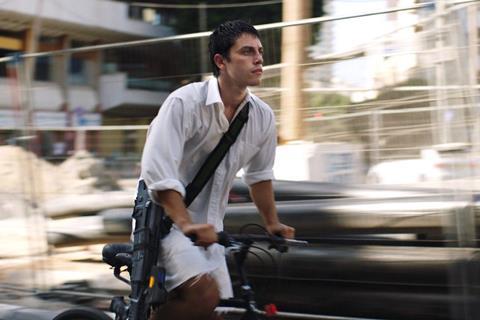A reluctant member of the Israeli Defence Force goes AWOL in Dani Rosenberg’s accomplished second feature

Dir: Dani Rosenberg. Israel. 2023. 96mins
If war is hell, can you simply run away? That’s what the title character of The Vanishing Soldier hopes to find out, abandoning the battlefield because he is tired of serving in the Israel Defence Force (IDF). Ido Tako is fascinatingly opaque as this teen soldier who wants nothing more than to reunite with his true love and start a new life, the character’s callowness a metaphor for so many young people who have been numbed by combat. Director and co-writer Dani Rosenberg balances absurdism and existential drama, slowly shifting our perspective on this young man: is he principled or lost as he shirks his onerous duty, creating unforeseen consequences in the world around him?
Balances absurdism and existential drama
Premiering at Locarno and now screening at Hamburg, The Vanishing Soldier has received 11 Ophir nominations from the Israeli Film Academy, including Best Picture, Best Director and Best Actor. This is Rosenberg’s second feature — his 2020 debut, The Death Of Cinema And My Father Too, won prizes in London and Jerusalem — and it demonstrates his ability to deliver a tonally nuanced and emotionally complicated tale. Further festival play seems assured.
Tako plays Shlomi, an 18-year-old Israeli soldier manning the frontline in Gaza, utterly disconnected from the fighting around him. Rosenberg provides a few brief vignettes underlining the absurdity of warfare — kids happily run through the middle of what is meant to be a tense showdown between the IDF and Hamas. Then, one day, Shlomi suddenly finds himself with access to a car, and decides to drive away as fast as he can. Meeting up with his girlfriend, a sous-chef named Shiri (Mika Reiss), he announces he wants them to get married, although he is less transparent about why he is suddenly back in Tel Aviv. Soon, though, the army comes looking for Shlomi.
The Vanishing Soldier boasts a provocative premise that Rosenberg builds on over the film’s runtime, creating new obstacles — some external, some internal — that make Shlomi’s impetuous plan increasingly difficult to carry out. When the soldier sees his mother Rachel (Efrat Ben Zur), she is grateful he’s alive but scared of what will become of him once the military realises he has gone AWOL. Shlomi insists he knows what he is doing, but Tako’s boyish features suggest a young man who has not thought this through, and the actor ably communicates the character’s growing understanding that running away will not solve his problems — especially once he learns that the government erroneously believes he has been captured by Hamas.
Rosenberg and Tako refuse to signal to the audience how to feel about Shlomi. While the film is critical of Israel’s ongoing confict, with several scenes punctuated by news reports of bombings which kill civilians on both sides, there is a noticeable vacuousness to Shlomi, cannily undercutting the notion that he is fleeing the frontline for righteous moral reasons. Instead, the character is somewhat unknowable — partly because he’s so young, with Rosenberg commenting on the cruelty of sending naive, not-fully-formed teenagers off to war.
As Shlomi goes from scheme to scheme to evade capture, including thievery and hijacking a vehicle at gunpoint, The Vanishing Soldier hints at an underdeveloped conscience at his core. Shlomi hates the war, but that opposition often comes across as youthful insolence, which sometimes makes his actions less than laudatory. The film eventually tips over into tragedy when Israel, thinking that Hamas is holding him hostage, responds with massive force, leading to terrible bloodshed. Shlomi wanted to save himself but, in the process, he caused the deaths of others: should he feel responsible? Rosenberg lets that troubling question sit with viewers while condemning a nation that would create such horrible ethical dilemmas for its citizens.
At just over 90 minutes, The Vanishing Soldier moves along quickly, with Yuval Semo’s anxious strings-and-percussion score heightening the unease. Rosenberg shoots the opening battle scenes from an ironic distance, making war seem hellish but also pointless, eschewing heroic or visceral moments. Once Shlomi goes on the lam, the film amplifies the story’s meditative bent: the soldier is trying to avoid capture but he largely spends time with his girlfriend and his mother, reconnecting to parts of himself that he lost while being a soldier. Growing up in a world where war and mandatory military service are all has known, Shlomi seeks freedom – but he cannot fathom what that might even look like, and so runs around in metaphorical circles. He can flee, but there’s no escape.
Production company: UCM
International sales: Intramovies, mail@intramovies.com
Producers: Avraham Pirchi, Chilik Michaeli, Moshe Edery, Leon Edery, Itamar Pirchi
Screenplay: Dani Rosenberg & Amir Kliger
Cinematography: David Stragmeister
Production design: Ben-Zion Porat
Editing: Nili Feller
Music: Yuval Semo
Main cast: Ido Tako, Mika Reiss, Efrat Ben Zur, Tiki Dayan, Shmulik Cohen







![The Brightest SunScreen[Courtesy HKIFF]](https://d1nslcd7m2225b.cloudfront.net/Pictures/274x183/3/5/0/1448350_thebrightestsunscreencourtesyhkiff_312678.jpg)














![The Brightest SunScreen[Courtesy HKIFF]](https://d1nslcd7m2225b.cloudfront.net/Pictures/100x67/3/5/0/1448350_thebrightestsunscreencourtesyhkiff_312678.jpg)

